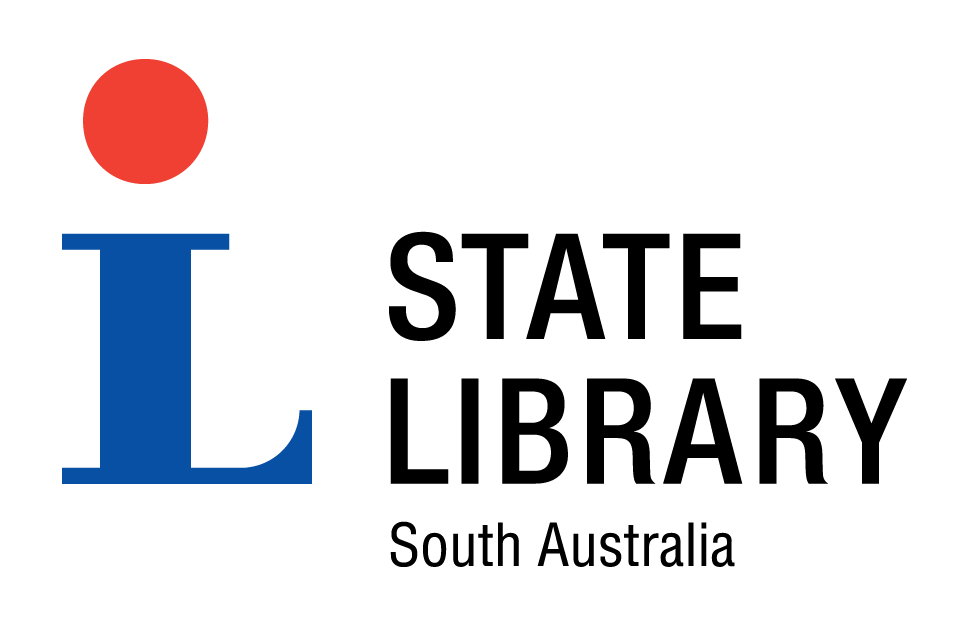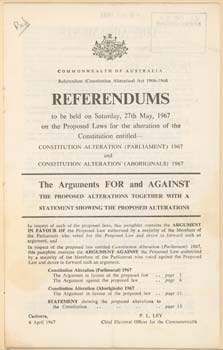
1967 Referendum : citizenship
- The 1967 Referendum
- Legislative background to the Referendum
- 1891 National Australasian Convention
- 1897 Constitutional Convention
- 1929 Royal Commission on the Constitution
- The Bleakley Report
- 1934 Aborigines Act
- 1938 Aborigines Progressive Association
- 1962 A Matter of urgent public importance
- 1965 Constitution Alteration (Repeal of Section 127) Bill
- 1967 Constitution Alteration (Aboriginals) Bill 1967
"We aborigines have been fighting for this referendum for 10 years"
Edmund O'Loughlin, Advertiser 26 May 1967, page 2.
The Referendum held on 27 May 1967 asked two questions of Australian voters.
The first question sought to break the nexus that existed between the number of Senators and Members of the House of Representatives in order to permit an increase in the number of Members without increasing the number of Senators. This question was defeated by a 3 to 2 majority of Australian voters.
The second question sought to amend the constitution as it related to Aboriginal Australians by amending two sections of the constitution.
The first amendment was to Section 51 paragraph xxvi that stated, "The Parliament shall, subject to this Constitution, have power to make laws for the peace, order, and good government of the Commonwealth with respect to: .... (xxvi) The people of any race, other than the aboriginal race in any state, for whom it is deemed necessary to make special laws."
The referendum proposed deleting the reference to 'the aboriginal race' as it was deemed discriminatory and denied the Commonwealth Parliament the opportunity to make special laws for Aboriginal people even if they were of an affirmative nature.
The second amendment proposed repealing section 127 of the Constitution, "In reckoning the numbers of the people of the Commonwealth, or of a state or other part of the Commonwealth, aboriginal natives shall not be counted."
It had been claimed that section 127 had been included in the Constitution because Aboriginal people in the late 19th century lived a mainly tribal and nomadic lifestyle creating "practical difficulties ... in satisfactorily enumerating the Aboriginal population". [Sir Robert Menzies, 11 November 1965, page 2638] Introducing the Constitution Alteration (Aboriginals) Bill 1967, Prime Minister Harold Holt, said, "The simple truth is that section 127 is completely out of harmony with our national attitudes and modern thinking. It has no place in our Constitution in this age." [1 March 1967, page 263]
When put to the Australian electorate the usual practice of presenting a 'Yes' case and a 'No' case for these two amendments was not followed as no Member of Parliament could be found to authorise a case against the proposed amendments.
The amendments also received broad community support, church leaders, unionists, sports people, and the media voicing their support.
These proposed amendments received 5,183,113 votes or 90.77% in favour, the biggest majority ever to be afforded to a referendum question in Australia.
Legislative background to the Referendum
1891 National Australasian Convention
Between the 6th and the 14th of February 1890 delegates from South Australia, Victoria, New South Wales, Queensland, Western Australia, Tasmania, and New Zealand met in Parliament House, Melbourne to consider the practicality of federation of the Australasian colonies.
When the delegates met the following year in Sydney to draft a constitution agreeable to all the colonies, Sir Samuel Griffith, of Queensland proposed the clause, "In reckoning the number of people of a state, or other part of the commonwealth, the aboriginal natives of Australia shall not be counted." [National Australasian Convention, 8/4/1891, pages 898/899] No discussion of the clause is recorded in the proceedings other than it was agreed to.
1897 Constitutional Convention
During the 1897 Constitutional Convention, Dr John Cockburn representing South Australia, defended the maintenance of the Aboriginal franchise particularly in states such as South Australia where they already held it. By chance Dr. Cockburn's amendment to protect the women's franchise, "41. No adult person who has or acquires a right to vote at elections for the more numerous House of the Parliament of a State shall, while the right continues, be prevented by any law of the Commonwealth from voting at elections for either House of the Parliament of the Commonwealth" also protected the existing franchise of Aboriginal voters, such as Aboriginal South Australians.
But some of his colleagues at the convention were not so liberal in their views. On 20 April 1897 in considering Clause 120, the exclusion of Aborigines from the census the following exchange occurred;
Dr. Cockburn: As a general principle I think this is quite right. But in this colony, and I suppose in some of the other colonies, there are a number of natives who are on the rolls, and they ought not to be debarred from voting.
Mr. Deakin: This only determines the number of your representatives, and the aboriginal population is too small to affect that in the least degree.
Mr. Barton: It is only for the purpose of determining the quota.
Dr. Cockburn: Is that perfectly clear? Even then, as a matter of principle, they ought not to be deducted.
Mr. O'Connor: The amendment you have carried already preserves their votes.
Dr. Cockburn: I think these natives ought to be preserved as component parts in reckoning up the people. I can point out one place where 100 or 200 of these aboriginals vote.
Mr. Deakin: Well, it will take 26,000 to affect one vote.
Mr. Walker: I would point out to Dr. Cockburn that one point in connection with this matter is, that when we come to divide the expenses of the Federal Government per capita, if he leaves out these aboriginals South Australia will have so much the less to pay, whilst if they are counted South Australia will have so much the more to pay.
Despite Cockburn's concerns the clause was agreed to.
On the 19th April the delegates had debated Clause 51, "The Parliament shall, subject to the provisions of this Constitution, have exclusive powers to make laws for the peace, order, and good government of the Commonwealth with respect to the following matters: I. The affairs of the people of any race with respect to whom it is deemed necessary to make special laws not applicable to the general community; but so that this power shall not extend to authorise legislation with respect to the affairs of the aboriginal native race in any State." They failed to raise any concern regarding its effect on the rights or welfare of Aboriginal Australians, but confirmed its purpose was to address concerns regarding "kanaka" or Pacific Island labourers and their impact on the racist White Australia policy.
Following the Federation of Australia on 1 January 1901, as if to underline the restrictions the Constitution placed upon Aboriginal Australians, the Commonwealth government in 1902 passed the Commonwealth Franchise Act. Section 4 stated, "No aboriginal native of Australia, Asia, Africa or the Islands of the Pacific except New Zealand shall be entitled to have his name placed on an Electoral Roll unless so entitled under section forty-one of the Constitution."
From the earliest days a conflict existed between the effect of Australia's treatment of its Aboriginal population on its international reputation and the racist policies of state governments.
1929 Royal Commission on the Constitution
Part of this national debate occurred in the context of the 1929 Royal Commission on the Constitution. It reviewed all sections including section 51 (xxvi) and reported that a "great number of witnesses before this Commission urged the need of giving increased attention to aborigines. Some ... took the view that complete control should be handed over to the Commonwealth .... It was urged that as the reputation of Australia may be greatly affected by the treatment of aborigines, the responsibility should rest with the national government." The argument for maintaining state control of Aboriginal affairs rested on the fact that the states controlled the land on which future reserves would be located and that the "State police were better qualified to control aborigines .... Though some witnesses expressed the view that in any case the care and management of the aborigines should not be in the hands of police." [Report of the Royal Commission on the Constitution, 1929, page 219]
Despite the potential impact on Australia's international reputation, the Commissioners recommendation was not to amend section 51 to give the Commonwealth the power to legislate for Aboriginal Australians. The lack of national legislation produced the need for another approach. The states and the Commonwealth agreed to meet regularly, in the process creating a de facto national policy approach to the treatment of Aboriginal Australians.
During 1928 J.W. Bleakley, Chief Protector of Aboriginals, Queensland, prepared a report for the Prime Minister titled "The aboriginals and half-castes of central Australia and north Australia." Bleakley made numerous recommendations, many of which can be seen in the policies of future state governments. He recommended that "cash payments direct to natives be discontinued, and wages be drawn in goods ... through the employers or the local Protector" [Bleakley Report, Parliamentary Papers General, 1929 vol. II, page 9], .... "To check as far as possible the breeding of half-castes by (a) strict enforcement of laws for protection and control of female aboriginals ... Collect all illegitimate half-castes, male and female, under sixteen years of age, not otherwise being satisfactorily educated, and place in Aboriginal Industrial Mission Homes for education and vocational training ... transfer those with preponderance of white blood to European institutions at early age, for absorption into the white population after vocational training." [Bleakley Report, Parliamentary Papers General, 1929 vol. II, page 29]
In 1934 the South Australian government passed the Aborigines Act, a consolidation of the Aborigines Act, 1911 and the Aborigines (Training of Children) Act, 1923. The Act passed the House of Assembly with little more than a paragraph of comment, "The Aborigines Acts deal with the control by the Aboriginal Department of aboriginals in this state and is consequently a branch of the law which is constantly being enforced." [14 August 1934 pg.489].
The devolution of responsibility to the states meant that Aboriginal Australians had different rights in different states, and the policies of some states became increasingly embarrassing for the Commonwealth government in international forums such as the United Nations.
1938 Aborigines Progressive Association
Also Aboriginal Australians were increasingly gaining a voice of their own. On Australia Day 1938 the Aborigine's Progressive Association convened a conference in Sydney to inaugurate a day of mourning and protest. John Patten, President of the association said, "We, as aborigines, have no reason to rejoice on Australia's 150th birthday ... Aborigines throughout Australia are literally being starved to death." [SMH 27/1/1938 pg.6]. In response and reportedly "agreeing" with John Patten's sentiments, Rev. John Sexton, secretary of the Aborigines Friends' Association said, "Full citizenship in the white community is not for the present aborigines, but for their children .... Dormitories should be established in every native station so that the children could be housed and trained in all the amenities of civilised life .... At a given age the children should pass into the white community to earn their living." [News 1/2/1938 pg.2]
1962 A Matter of urgent public importance
On 30 August 1962 Hansard records that the Speaker, Sir John McLeay, "received a letter from the honourable member for Fremantle (Mr. Beazley) proposing that a definite matter of urgent public importance be submitted to the House for discussion, namely - The need for the Parliament to legislate for a referendum to delete from the Constitution of the Commonwealth of Australia Section 127 and to delete the words "other than the aboriginal race in any state" from section 51 paragraph xxvi."
During the debate, Mr Beazley confirmed the embarrassment caused to the Commonwealth by state laws, "At international conferences the Commonwealth bears the odium of any discrimination against aborigines. Absence of any discrimination would be a significant part of the ideological defences of the nation." [30 August 1962 pg. 878]. The Member for Bryant, Mr Wills, said, "It is one of the tragic facts of Australian life that, on the mainland, an aboriginal is absolutely free only in Victoria.... Section 17 of the Aborigines Act of South Australia provides for the removal of aborigines to reserves." [30 August 1962 pg. 883]
1965 Constitution Alteration (Repeal of Section 127) Bill
The increasing concern with the discordant nature of the constitution resulted in the Commonwealth government introducing the Constitution Alteration (Repeal of Section 127) Bill on 11 November 1965. Introducing the Bill, the Prime Minister, Sir Robert Menzies, stated the reason for not introducing an amendment to section 51 (xxvi) was because that section in fact protected Aboriginal Australians from the possibility of the Commonwealth government introducing discriminatory laws. Dr Jim Cairns, along with other ALP Members, argued that amendment of section 51 (xxvi) should be included, pointing out that its existence had not prevented the Parliament from passing discriminatory laws in the past.
Arthur Calwell, Leader of the Opposition, speaking in support of the Bill said, section 127 "is foreign to our aims for our nation and for the Aboriginal section of our population ... It is unfortunate that such a provision was ever placed in the Constitution." [23/11/1965 pg.3067]
Despite the misgivings about the Bill's shortcomings it was passed by the House of Representatives with an absolute majority on the 23rd November 1965.
The retirement of Menzies in January 1966 and the Federal election campaign in November 1966 meant that the constitutional requirement that proposed changes to the constitution be submitted to the electors in each state and territory not less than two nor more than six months after its passage through both houses of Parliament was not met, and the legislation lapsed.
1967 Constitution Alteration (Aboriginals) Bill 1967
The government of Harold Holt was returned to office in 1966 and the Constitution Alteration (Aboriginals) Bill 1967 was presented by the Prime Minister to the House of Representatives on 1 March 1967. Considerable lobbying had occurred since the passing of the 1965 Bill and this Bill proposed amending section 51 of the Constitution by removing reference to the Aboriginal Race, as well as repealing section 127. The Leader of the Opposition, Gough Whitlam, declared, "I can assure honourable members and all our fellow citizens that my party ... will support this Bill and the referendum without reservation, equivocation or qualification." [1 March 1967 page 264].
The Bill passed the first, second and third reading stages in the one day. The speed with which it was passed is indicative of the unanimous support given to the legislation.
On the 10th of August 1967 the "Constitution Alteration (Aboriginals) Act, 1967 was assented to.









